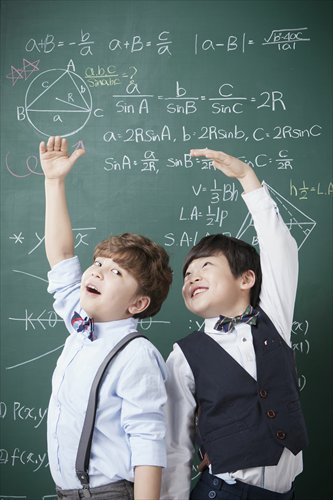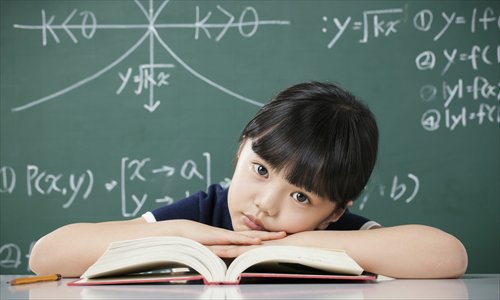Molding mathletes
Can China learn about math education from the US?

Chinese students have increasingly become interested in participating in American math contests organized by elite institutions. Photo: IC
Standing in front of more than 20 teenagers in a classroom in Haidian district, a hub of China's best colleges and middle schools, Zhang Mingyu attempts to decode and elaborate on a question posed by the American Mathematics Competitions (AMC). He also helps his students understand the questions which were originally written in English, by breaking down the sentence structure and decoding the grammar.
Zhang is a young coach working with the Beijing Mathematical School Team, an organization devoted to honing the math brains at middle school, by preparing students for domestic and international competitions.
"An increasing number of parents and students in Beijing have been drawn to math contests in the US," said Zhang.
"The achievements in these contests demonstrate students' excellent academic ability, increasing their opportunities for admission to America's elite academies and colleges."
Preparing for contests
Li Aolong, a math enthusiast, entered the AMC in 2011 when he was a high school student at Sun Weigang Math Experimental Class at Beijing No.22 Middle School [Sun Weigang is considered the father of China's math education]. At the time, all his classmates were encouraged by teachers to enter the competition.
"It was a fresh and interesting experience because it was quite different from China's math contests," said Li.
"The questions were set in intriguing circumstances, different to China's questions which usually follow a rigid format."
Preparation for the AMC requires a lot of self study. Li became accustomed to the American style of posing math problems by reading and practicing.
A good understanding of the English language is also vital for entering these competitions. One should be familiar with English math vocabulary, said Li.
For Chinese students fortunate enough to go to the US to compete in math contests on elite campuses, the importance of team work is another lesson.
In 2013, Zhang was among the coaches who led a group of about 40 students to the US for the Exeter Math Club Competition (EMCC) of the Phillips Exeter Academy [a top American high school that has produced top achievers in math and science, as well as Facebook co-founder Mark Zuckerberg].
Apart from taking part as individuals, students were also required to form groups of four for the team competition.
"We group students of different specialties together to optimize their performance. For example, each team had a contestant who was good at English," said Zhang. At that time, four Chinese students were ranked among the top 10 in the individual competition, while one Chinese team placed fifth.

Experts say math education for children should promote critical thinking and problem-solving skills rather than solving difficult questions to win contests. Photo: IC
Math in the US
Besides the AMC of The Mathematics Association of America and the EMCC, there are several other appealing math contests in the US among Beijing's young math-lovers, including the Harvard-MIT Mathematics Tournament (HMMT); the Princeton University Mathematics Competition (PUMaC) and the Stanford Math League Competition.
The most popular one is the AMC, which is divided into three categories for students in different grades.
Competition venues were allocated in Beijing after test papers were delivered from the US. All answer sheets are sent back to the US for marking and final results.
"In Beijing alone, approximately 2,500 students compete in each category of the AMC," said Zhang. "Chinese students are usually at an advantage in the contest because the questions mainly focus on basic math knowledge."
Dan Flegler, co-founder of the Stanford Math League Competition, was quoted by a New York Times website article in September as saying that "the only students who ever got perfect scores in the speed round [in which contestants need to solve 60 questions within 45 minutes] were two fraternal Chinese twins, a boy and a girl."
The article, which is about a group of Chinese students at the annual China versus US Math League contest at Stanford University, suggested that the exam-driven preparation for the gaokao [national college entrance examinations] destroys students' enthusiasm and curiosity in the subject, while the Math League, which "is committed to having kids worldwide enjoy math and discussions about problem-solving, is becoming popular among Chinese math-lovers."
Hu Rui, coach of the Chinese team, said in the article that the questions of The Math League "present fun and creative problems that promote critical thinking and problem-solving skills that are missing in the current exam-oriented, cram education system in China."
Improving math education
In Zhang's opinion, there are some things China can learn from American math education.
American-born Chinese students demonstrate a higher math ability because their Chinese parents focus on stable basic education, and they grow up in an American education environment.
Andy Loo, who comes from Hong Kong and is currently the Math Club President at Princeton University, agrees.
Loo attributed the difference in performance to the differences between the American and Asian education systems.
"Most American high schools run on the credit system, where students choose courses every term based on their interests and needs. On the contrary, Asian education systems impose a fixed and uniform curriculum for all students who study a certain subject."
At Phillips Exeter Academy, for example, students can choose a course that is designed to teach problem-solving skills through the practice of Olympiad-style problems, said Loo.
Asian countries should amend their education system so that it "enables every student to develop and express their individuality, which is the real source of innovation and progress," he said.
Competing against the best
In January, China's Ministry of Education put a stop to giving students who do well in math Olympiads additional points in the gaokao in an effort to alleviate the pressures on Chinese students in general.
The reality, however, is that these math contests are targeted at a very limited and elite group of people.
"For true math- lovers and geniuses, attending these contests is a way to challenge yourself and to improve," said Zhang, who was once a winner of a national Chinese math Olympiad.
Loo started participating in math competitions in primary school. He enjoyed competing against highly-motivated and dedicated talented students in international math competitions.
"One time I shared a room with my Hong Kong teammate who became an International Mathematical Olympiad gold medalist. When I woke up the next morning, the first thing he said to me was not 'Good morning,' but 'let n be a positive integer!' He is immersed in mathematics every minute of his life!"
The most valuable lessons learned from math Olympiads, said Loo, are the problem-solving and logical-thinking abilities, better preparing him for higher academic pursuit and real-life situations.
"Nowadays, various disciplines such as economics, physics and computer science, have become increasingly math-intensive, and my math ability has really given me an edge in these subjects," he said.
At the latest IMO, the Chinese team was beaten by the US. But Li and Zhang are unfazed by this.
Instead, they believe China's math ability will rise in the future.
After Li read the Math League questions, he said most of the math-solving ability required was taught in China and used in math Olympiads for primary school students. "There are various ways to inspire children's interest in math and many Chinese teachers have been working on it."
Coach Zhang is already working on developing an online video lesson for children interested in math to inspire them to explore further.
In Zhang's opinion, math education should be taught in accordance with students' mental growth. "Apart from the math Olympiad, it is important to get more children to fall in love with math."
"China has no winner of the Fields Medal [considered to be the Nobel Prize in math] so far. But there are many Chinese math masters, and I believe there will be a day when they will win it," he said.